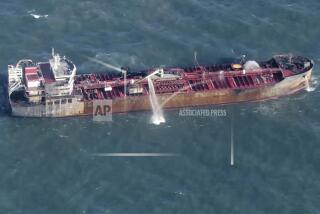Tanker Mishaps Rocket, Despite Focus on Safety : Shipping: The rate of increase in accidents is outstripping the rate of tankers being added to the world fleet.
- Share via
Talk about bad timing.
As oil company officials gathered in Monterey for an industry conference on tanker shipping over the weekend, tanker spills were all over the headlines:
* In the Gulf of Mexico Saturday, the Norwegian tanker Mega Borg, carrying 38 million gallons of crude, exploded spectacularly and caught fire, killing crew members and disgorging a massive oil spill. More explosions rocked the tanker Sunday.
* Just two days earlier, the British tanker BT Nautilus ran aground in the waterway between New York and New Jersey, dumping more than 260,000 gallons of home heating oil--the fifth oil spill in the waterway this year.
The spills occurred despite the fact that the industry is paying greater attention to shipping safety in the wake of the nation’s worst spill, the Exxon Valdez accident off Alaska last year.
“They are almost terrified with what can happen with an oil spill in the U.S., and that’s good,” said Arthur McKenzie, director of the Tanker Advisory Center in New York and a former Exxon shipping executive.
Some industry officials argue that the pace of accidents is no worse than in the past. “I would have to say that (the number of the weekend’s accidents) is more likely coincidence than an indication of any increased frequency of tanker incidents,” said Richard Golob, president of World Information Systems in Cambridge, Mass., which monitors oil spills.
Nevertheless, the Gulf and New York accidents--and a mishap between a freighter and a transport ship off the coast of China before dawn Friday--are certain to focus new attention on the safety of shipping oil over water.
McKenzie reported that the number of tanker accidents, from minor collisions to sinkings, increased 17.1% to 528 in 1989 from 451 in 1986, after dipping to 408 in 1987. In the first quarter of 1990, there have been 156 accidents alone, an annual pace of more than 600, he added.
The rate of accidents has jumped faster than the rate of tankers being added to the world fleet, which went up 5.5% to 3,305 at the beginning of this year from a low of 3,132 in 1987, he added.
Industry officials were loath to generalize about possible safety problems. But a shipping executive with a major oil company was alarmed by the grounding in New York harbor, which occurred while a pilot was on board. “I’m sure it doesn’t suggest that they don’t know what they’re doing, but it does make you wonder a little about the qualification of pilots,” said the executive, who asked not to be named.
“I think the standards of education and training throughout the merchant marine have probably suffered a bit,” he added. He blamed smaller crews, budget cuts at regulatory and enforcement agencies such as the Coast Guard and less rigorous licensing and testing.
The Gulf accident, which occurred during a “lightering” operation, raised questions about the safety of lightering, the common practice of transferring oil from a large vessel to a smaller one. The practice is increasing in Gulf waters, raising the chance of collisions, the Coast Guard said.
For their part, U.S. oil company executives said Sunday that they were paying more attention to tanker safety. Many companies have toughened controls on alcohol and drugs on board.
Others, like Atlantic Richfield, have stepped up the frequency of training for bridge crews, focusing on team training. Still others are making tougher demands of foreign vessels they charter, such as requiring inspections before sailing or prohibiting alcohol on board.
Meanwhile, most oil companies have raised their oil pollution insurance coverage on tankers from between $400 million and $500 million to as high as $800 million, observers said.
Although U.S. companies are making increased efforts, industry officials say they have little control over hazards presented by foreign-flag operators. The need for imported oil has forced the industry to rely more heavily on shipping by smaller operators, and many have lower standards for training and tanker maintenance, according to Jerry Aspland, president of Arco Marine.
Tankers flagged from industrialized or European nations with high training and maintenance standards may carry crews from countries that do not have such standards, Aspland added. The tanker burning in the Gulf of Mexico, for example, carries a Norwegian flag, but a Philippine and Indian crew.
Other executives said it is unfair to stigmatize Third World crews, and argued that a flag from a European nation is no guarantee of safety.
CRISIS AT SEA: Explosions aboard a Norwegian tanker send oil into the Gulf of Mexico. A1
More to Read
Sign up for Essential California
The most important California stories and recommendations in your inbox every morning.
You may occasionally receive promotional content from the Los Angeles Times.









